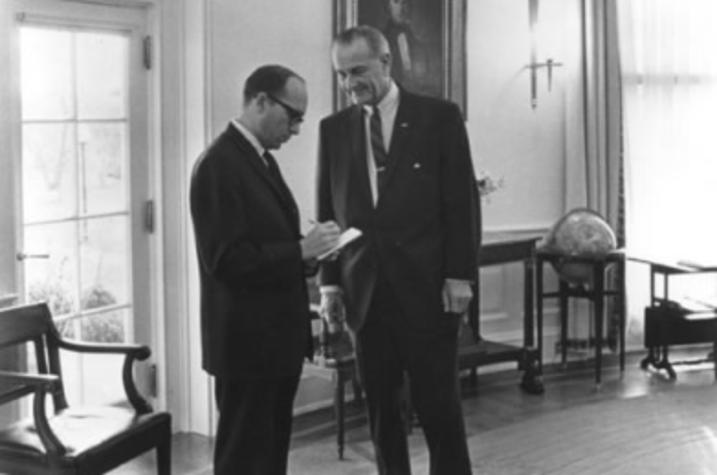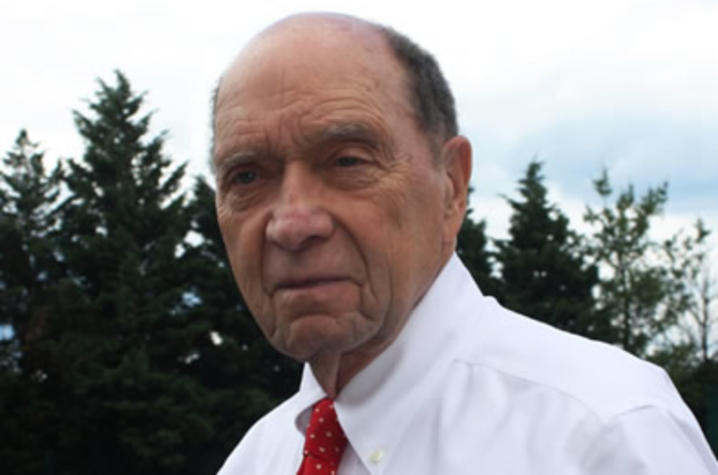Reporter at Kennedy Assassination, LBJ Oath Sid Davis to Speak Today
LEXINGTON, Ky. (Sept. 4, 2018) — A journalist in the reporter pool when President John F. Kennedy was assassinated and who was selected to cover the swearing in of President Lyndon B. Johnson aboard Air Force One is the featured speaker at the inaugural Earle C. Clements Lecture-Symposium today (Sept. 4). Presented by University of Kentucky Libraries Wendell H. Ford Public Policy Research Center, the free public talk by Sid Davis will begin 4:30 p.m. in the UK Athletics Auditorium in William T. Young Library.
Sid Davis writes and lectures on the presidency, the press, politics and current issues in the news. Davis has spent some 40 years as a White House correspondent and news executive. He was a vice president and Washington Bureau chief for NBC News and Washington Bureau chief and White House correspondent for Westinghouse Broadcasting Company.
As White House correspondent for Westinghouse Broadcasting Company in November 1963, Davis was in the Dallas motorcade and heard the shots when President Kennedy was assassinated. He was one of the three pool reporters selected to cover the swearing in of President Johnson aboard Air Force One in Dallas, following the assassination. The other two pool members were Merriman Smith of United Press International and Charles Roberts of Newsweek magazine.
Davis traveled hundreds of thousands of miles covering nine presidents. He made trips with presidents to Vietnam, the former Soviet Union, the Peoples Republic of China, Korea, Latin America, the Middle East and Europe. He has served as program director at the Voice of America and as a guest scholar on media at the Brookings institution.
Davis started as a reporter with WKBN-TV, in Youngstown, Ohio, before moving up to station news director. He is a graduate of Ohio University at Athens, Ohio, where he was inducted into the Ohio University College of Communication Hall of Fame.
The Earle C. Clements Lecture-Symposium is designed to share Earle C. Clements’ legacy with current and future public policy leaders by featuring renowned intellectuals and scholars in the areas of public policy and government. Its purpose is to draw student and community interest in these roles, reflecting a dedication to public life and service that was modeled by Earle Clements.
Clements’ political career in Kentucky included service as a county sheriff, clerk and judge; terms in the state senate and as governor; and terms in both the U.S. House of Representatives and U.S. Senate, where he was a close colleague to the future President Johnson.
The Ford Center is honored to have Davis deliver the first Clements Lecture-Symposium. “The connection between the Clements family and Lyndon Johnson reaches beyond their political ties. So, on the occasion of the inaugural Earle C. Clements lecture, it is even more powerful to host a distinguished speaker who is also deeply connected to Johnson and the politics of that time,” said Deirdre Scaggs, interim dean of UK Libraries and director of the Ford Center.
The Clements Lecture-Symposium is made possible by the Clements Memorial Fund, a gift from the Abell family. The Clements Memorial Fund builds on the Abells’ philanthropic legacy of supporting public service in Kentucky.
The Special Collections Research Center at UK Libraries sustains the Commonwealth’s memory and serves as the essential bridge between past, present and future. By preserving materials documenting the social, cultural, economic and political history of Kentucky, the center provides rich opportunities for students to expand their worldview and enhance their critical thinking skills. Special Collections Research Center materials are used by scholars worldwide to advance original research and pioneer creative approaches to scholarship. UK Libraries Special Collections Research Center is the Archives, the Louie B. Nunn Center for Oral History, the King Library Press, the Wendell H. Ford Public Policy Research Center, the Bert T. Combs Appalachian Collection, the John G. Heyburn Initiative and ExploreUK.






